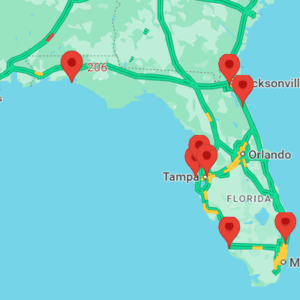Drug Possession Defense Attorneys
Possession charges can be defended in many ways. Some common defenses include knowledge of the presence of the narcotics, dominion and control over the narcotics and the state’s ability to prove the substance is a prohibited substance. Additionally, law enforcement often discovers narcotics from an unlawful vantage point or fails to properly obtain and/or execute a search warrant. The best criminal defense attorneys review all these scenarios and more in a swift and thorough manner.
Facing drug possession charges in Florida can have a profound effect on your life, including potential legal penalties and personal repercussions. But with Bernhardt Riley, Attorneys at Law, PLLC, by your side, you will have a committed ally in your corner. Our firm, with a strong foundation in Palm Harbor and offices in Destin, Tampa and Clearwater, provides vigorous legal defense for those accused of drug possession. We understand that every drug possession case is unique, and we approach each situation with a tailored defense strategy designed to protect your legal rights.
Understanding Drug Possession Charges In Florida
In federal states, drug possession laws make it unlawful to possess drug paraphernalia or other drugs, including marijuana. The laws impose further penalties on the possession of the precursor substance used in drug cultivation. What constitutes drug possession may vary, however, depending on the substance, the amount, and the location in which it occurred.
The following drug possession summary explains the elements involved in possession, the categories of the legislation and the charges for the paraphernalia:
- Possession of a controlled substance – Florida Statute 893.13(6)(a). Unless the controlled substance was lawfully obtained, a person may not be in actual or constructive possession of a “controlled substance.” Controlled substances include cocaine, heroin, hydrocodone, oxycodone, opium, methamphetamine, codeine, fentanyl and many others. Depending on the type and amount of drug possessed, a conviction can lead to a felony charge and five to 15 years in prison.
- Possession of marijuana – Florida Statute 893.13(6)(b). The legal landscape is constantly shifting in its enforcement of marijuana laws. If you or a loved one has been arrested for a marijuana-related crime and you want more information, contact us today.
- Sale of a controlled substance – Florida Statute 893.13(1)(A) – Generally, a person may not sell, manufacture, deliver (or possess with intent to sell, manufacture, or deliver), a controlled substance. A person who violates this provision could receive a wide range of possible sentences, depending on the controlled substance. These sentences are enhanced if contraband is sold too close to certain locations, such as schools and parks; or illegal transactions occur at certain times of day.
- Trafficking drugs – Florida Statute 893.135 – In Florida, you may be charged with Trafficking a Controlled Substance even if you had no intent to sell or deliver the substance. The state only has to prove that you possessed a certain weight of the substance. If sentenced under the Trafficking statute, the sentence must include a prison sentence ranging from three to 25 years. The judge will have no authority to depart from the mandatory prison sentence.
In some cases, drug possession includes possession of drugs like cocaine, meth and heroin. The federal government said in a statement that drug possession was the main reason behind more than half of the arrest cases in the United States. Nearly a quarter of these arrests were reportedly due to marijuana possession. As a result, police efforts to tackle this crime have almost tripled over the past twenty years.
Providing Resources To Help You Fight An Addiction
At times, helping someone with a criminal case is larger than trying to get the state to drop or reduce the charges. At Bernhardt Riley, Attorneys at Law, PLLC, we emphasize helping those who desire to overcome addiction while thoroughly defending their rights.
Of course, your case would still be reviewed for any and all potential legal defenses. But in addition to legally defending your case, we specifically put an emphasis on helping people fight addiction. Attorney Stephen M. Bernhardt brings extensive experience as a former state representative of the Drug Court Program.
The State Attorney’s Office lacks the time to make every person an offer that is unique to their individual situation. Thus, many people end up with a sentence that is actually harmful to their recovery attempts. This applies to all kinds of cases, not just possession charges. Far too often, a theft or battery is a by-product of an addiction to drugs or alcohol.
Arbitrary jail sentences and one-size-fits-all probation sentences can have the effect of making recovery more difficult or setting one up to fail. Whatever your situation, our experienced attorneys Bernhardt Riley, Attorneys at Law, PLLC, work to protect your rights and improve the future of every client. If you would like to discuss how drug and alcohol rehabilitation courses, programs and facilities can positively impact your case, please contact us today.
Fight Drug Possession Charges With Bernhardt Riley, Attorneys at Law, PLLC‘s Dedicated Legal Team
Our legal team will thoroughly analyze the circumstances of your arrest, question the evidence presented and explore all avenues for a strong defense. We are here to offer the support and advocacy you need to face drug possession charges with confidence. Don’t let drug possession charges determine your future.
Contact Bernhardt Riley, Attorneys at Law, PLLC, for a consultation and let us help you navigate the complexities of your case. Call us at 727-335-3575 or use our online contact form to get in touch. Our experienced defense attorneys are ready to provide you with the personalized attention and robust representation you deserve.










